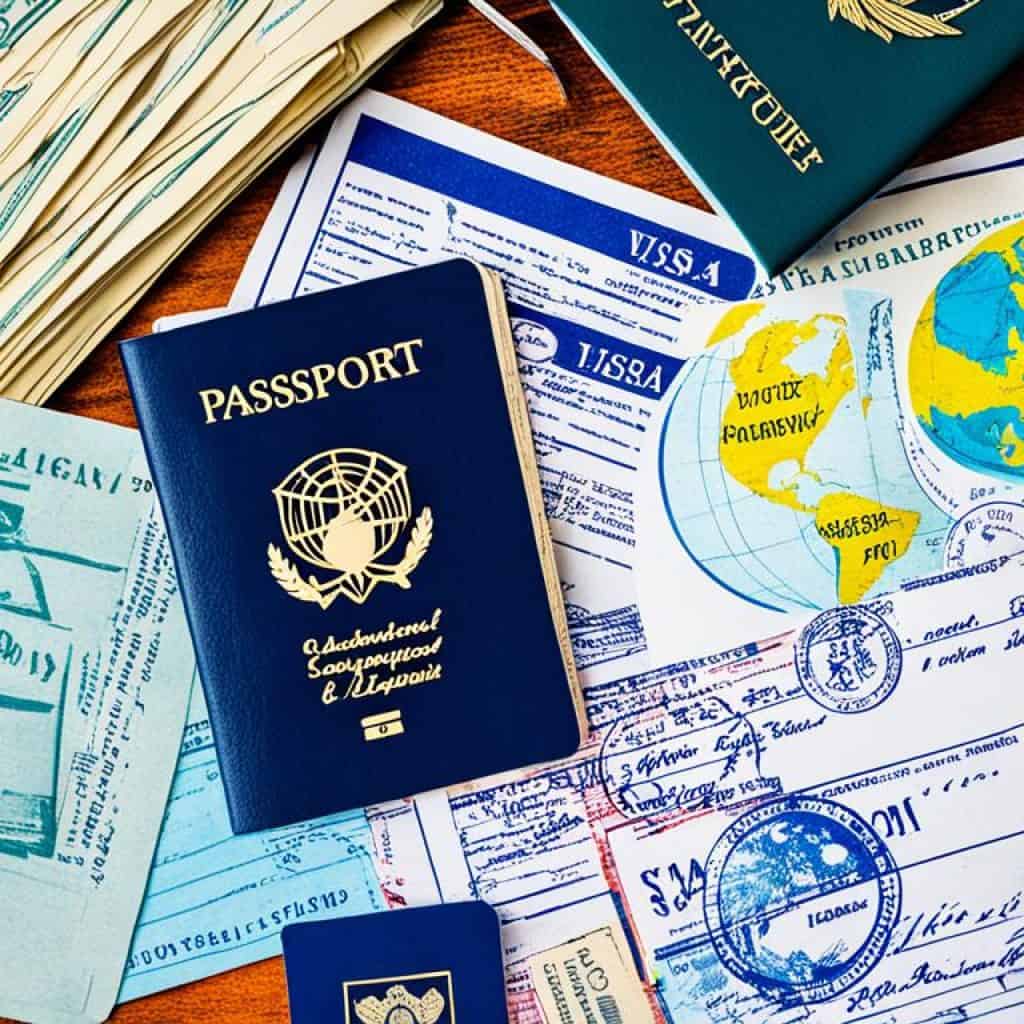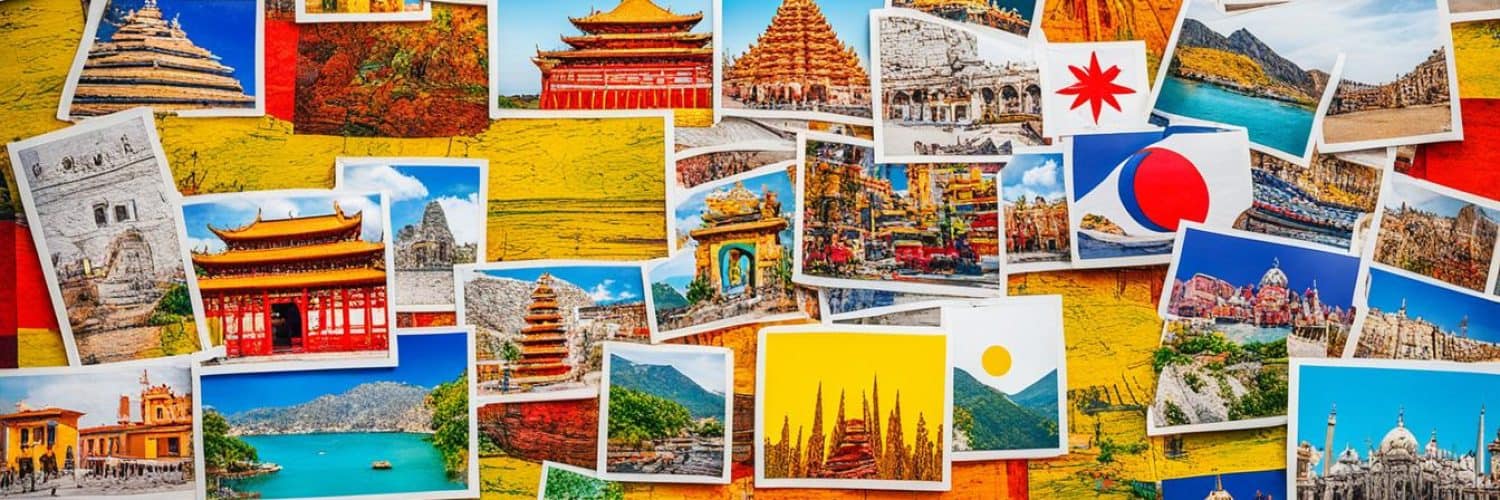Have you ever wondered what it’s like to live as an expat? What exactly does it mean to be an expat? Is it just living in a different country, or is there more to it? The world of expatriates is full of mystery and intrigue, with a myriad of reasons that drive individuals to pack their bags and start a new life in a foreign land.
So, what’s an expat? In simple terms, an expat is someone who lives and works in a different country to where they have citizenship. But the expat life is much more than that. It’s a journey of self-discovery, cultural immersion, and personal growth. It’s about stepping out of your comfort zone and embracing new experiences.
In this article, we dive deep into the world of expats, exploring the meaning, the challenges, and the rewards of the expat life. Join us as we unravel the mysteries and unveil the truths behind the expat experience.
Key Takeaways:
- An expat is someone who lives and works in a different country to where they have citizenship.
- The expat life is a journey of self-discovery, cultural immersion, and personal growth.
- Living as an expat means stepping out of your comfort zone and embracing new experiences.
- Throughout this article, we will explore the meaning, challenges, and rewards of the expat experience.
- Join us as we unravel the mysteries and unveil the truths behind the expat life.
Reasons to Become an Expat
There are numerous benefits to becoming an expat and embarking on the exciting expat lifestyle. Whether you’re yearning for a change of scenery, seeking new career opportunities, or simply looking to immerse yourself in different cultures, being an expat can be a rewarding and transformative experience.
- Experiencing a Different Culture: One of the biggest advantages of being an expat is the opportunity to fully immerse yourself in a new culture. From trying new foods to participating in local traditions, embracing a different way of life can broaden your horizons and deepen your understanding of the world.
- Learning a New Language: Living in a foreign country presents the perfect opportunity to learn a new language. Not only does this open doors to better communication with locals, but it also enhances your cognitive abilities and can even boost your career prospects.
- Gaining a Broader Perspective: By living in a different country, you’ll gain a broader perspective on global issues and develop a greater appreciation for cultural diversity. Exposing yourself to different ways of thinking and living can challenge your assumptions and expand your horizons.
- Expanding Professional Opportunities: Becoming an expat can provide unique career opportunities that may not be available in your home country. From international companies to emerging industries, the expat lifestyle can lead to exciting professional growth and new challenges.
- Sense of Adventure and Personal Growth: Living as an expat often comes with a sense of adventure and the chance to step out of your comfort zone. This can lead to personal growth as you adapt to new surroundings, face unfamiliar situations, and develop resilience and independence.
Furthermore, joining an expat community can provide a valuable support network where you can connect with like-minded individuals who are going through similar experiences. These communities offer a sense of belonging and understanding, making the expat journey feel less daunting and more enjoyable.
So, whether you’re driven by the allure of new cultures, professional opportunities, personal growth, or the sense of community that comes with being an expat, taking the leap into the expat lifestyle can be a truly enriching experience.
The Different Types of Expats
When it comes to living and working in a foreign country, expats come in various forms, each with their own unique motivations and circumstances. Understanding the different types of expats can help individuals identify where they fit in and navigate their expat journey. Whether you’re considering a new job opportunity, seeking adventure, or longing for a better quality of life, there’s a niche for everyone in the expat community.
1. Foreign Assignees
Foreign assignees are expats who are relocated by their employers to a different country for work purposes. These individuals often have specific skills or expertise that are required in their host country. They may be sent to oversee international projects, manage global teams, or establish new business operations. Foreign assignees typically have stable employment and receive support from their companies to ensure a smooth transition.
2. Explorers
Explorers are adventurous souls who seek new experiences and cultural immersion. They embrace the expat life to broaden their horizons, challenge themselves, and satisfy their wanderlust. Explorers often prioritize personal growth and are open to exploring diverse locations and cultures. They thrive on discovering the unknown and view each destination as an opportunity for self-discovery and exploration.
3. Optimizers
Optimizers are individuals who choose the expat life to improve their quality of life. They may be seeking better career prospects, higher standards of living, or a more favorable work-life balance. Optimizers are driven by the desire to enhance their overall well-being by leveraging the opportunities offered by a new country. They value the benefits that come with living and working abroad, such as better healthcare, education, or a more vibrant cultural scene.
4. Traveling Spouses
Traveling spouses are partners or spouses of individuals who are employed abroad. These expats relocate to support their loved ones and maintain their relationships while exploring the host country. Traveling spouses may seek opportunities to volunteer, pursue personal interests, or build a new professional network. They play a vital role in providing emotional support to their partners and creating stability within the expat family unit.
5. Romantics
Romantics are expats who choose to move to be with their partners, often called “love migrants.” They relocate to another country to join their spouse or loved one, embracing the challenges and opportunities that come with international relationships. Romantics may face hurdles such as language barriers and cultural differences but are determined to make their relationship work despite the distance and cultural adaptation.
6. Commuter Expats
Commuter expats are individuals who travel to a host country for short periods, usually for work-related reasons. Unlike long-term expats, they maintain their primary residency in their home country and commute to the host country as required. Commuter expats often have specific contracts or projects in the host country and return home periodically. This lifestyle allows them to maintain a connection with their home country while simultaneously experiencing the benefits of working abroad.
Understanding the different types of expats is essential for anyone considering the expat life. Each category represents a unique set of motivations and challenges that can influence an individual’s experience abroad. By identifying where you fit in, you can approach your expat journey with clarity, purpose, and the right mindset to make the most of your time living and working in a foreign country.
The Impact of Brexit on Expats
Brexit has had a significant impact on expats, particularly those from the UK. With the new regulations, UK citizens without residency permits are now limited to stays of up to 90 days within a 180-day period in the European Union (EU). This has implications for UK expats who wish to continue living in the EU.
To ensure a smooth transition, UK expats are advised to register as residents in their host countries. This will help them secure their rights and access essential services. Additionally, depending on the new country’s rules, UK expats may need to obtain health insurance to comply with local regulations.
Staying informed about the latest regulations is crucial for UK expats. It is essential to understand the requirements and ensure that all necessary documentation is in order. Adhering to the new rules will enable UK expats to continue their lives abroad without interruption.
Comparison of Expats' Rights Before and After Brexit
| Expats’ Rights | Before Brexit | After Brexit |
|---|---|---|
| Freedom of Movement | Unrestricted stay within the EU | Restricted to 90 days within a 180-day period |
| Residency | Protected by EU membership rights | Require registration in host countries |
| Healthcare | Access to reciprocal healthcare agreements | May need to obtain health insurance |
| Work and Business | Unrestricted employment and business opportunities | Dependent on host country’s regulations |
Table: A comparison of expats’ rights before and after Brexit.
The changes brought about by Brexit have created a new landscape for expats. By understanding the impact and taking the necessary steps, expats can navigate the post-Brexit era with confidence, ensuring their continued rights and a smooth transition to their chosen host countries.
Preparing to Become an Expat
Before embarking on your journey as an expat, thorough preparation is essential. By taking the time to gather the necessary documentation and complete important checklists, you can ensure a smoother transition to your new life abroad. Here are some key steps to consider:
1. Obtaining Visas and Residence Permits
Research the visa requirements of your chosen country and apply accordingly. Determine if you need a residence permit and understand the application process. Be aware of any specific documentation or financial requirements.
2. Ensuring Vaccinations are Up to Date
Prioritize the health and well-being of both yourself and your family members. Check the recommended vaccinations for your destination and make sure everyone is up to date.
3. Understanding Shipping Restrictions and Taxes
If you plan to bring belongings with you, be aware of any restrictions on imported items and the associated taxes. Research shipping logistics and consider if it’s more cost-effective to sell, donate, or store certain possessions.
4. Arranging Import Taxes for High-Value Items
If you have high-value items, such as artwork or electronics, understand the process and costs involved in importing them into your new country. Consult with customs officials or a shipping agent for guidance.
5. Considering Vaccines and Quarantines for Pets
If you have furry family members joining you on your expat journey, research the vaccine requirements and quarantine regulations of your destination country. Plan accordingly for their care and entry into the new country.
6. Ensuring Valid Documents
Make sure all essential documents, such as passports, birth and marriage certificates, proof of citizenship, and employment records, are current and easily accessible. Take the time to organize these documents in a safe and secure manner.
7. Checking Country-Specific Requirements
Each country has its own unique requirements for expats. Check with the relevant embassy or consulate of your destination country to ensure you are aware of any specific documents, certifications, or registrations that may be needed.
Remember to allocate sufficient time for document processing and to address any specific country-related requirements well in advance of your planned move.

By following these steps and being proactive in your preparations, you can set yourself up for a successful expat experience. Taking care of the necessary documentation and checklists ahead of time will allow you to focus on embracing your new adventure and making the most of your time as an expat.
Financial Considerations for Expats
When embarking on the expat journey, it’s essential to consider the financial aspects that come along with living abroad. Proper financial planning and careful decision-making can ensure a smooth transition and a secure financial future. Here are some key financial considerations for expats:
Banking Abroad
One of the first things expats should do is review their banking arrangements. It’s important to notify your existing bank of your relocation and inquire about their services in the new country. Consider whether your current debit and credit cards will be suitable for use abroad or if you need to make alternative banking arrangements.
Driving Considerations
If you plan on driving in your new country, make sure to research the driving regulations and requirements. In some cases, you may need to renew your driving license or obtain an international driving permit. Understanding the local driving laws ensures compliance and trouble-free exploration of your new surroundings.
Accommodation
Whether you choose to rent or buy property in your new country, it’s crucial to consider the financial implications. Research the local real estate market, including housing prices, rental costs, and property taxes. Evaluate your budget and explore various accommodation options that align with your financial goals.
Research Living Costs
Before making the big move, it’s important to research the cost of living in your new country. Take into account expenses such as housing, utilities, transportation, groceries, healthcare, and education if you have children. This will help you create a realistic budget and manage your finances effectively in the new environment.
Job Opportunities
Understanding job opportunities in your new country is vital, especially if you plan to work as an expat. Research the local job market, identify industries with high demand, and assess your skills and qualifications in relation to potential job prospects. Networking and connecting with local professionals and expat communities can help you explore job opportunities and expand your professional network.
Insurance Needs
Ensure you have appropriate insurance coverage to protect yourself and your belongings in your new country. Health insurance is particularly important as it safeguards against unexpected medical expenses. Additionally, consider property insurance if you own a home or valuable assets. Working with an insurance provider who specializes in expat needs can help you navigate the complexities of insurance abroad.
Financial Checklist for Expats
| Financial Considerations for Expats: |
|---|
| Notify your bank and assess banking arrangements |
| Research driving regulations and obtain necessary permits |
| Evaluate accommodation options and consider financial implications |
| Research and plan for the cost of living in your new country |
| Explore job opportunities and networking possibilities |
| Ensure appropriate insurance coverage for health and property |
By considering these financial aspects, expats can better prepare themselves financially and enjoy a worry-free expat experience. It’s important to conduct thorough research, seek professional advice when necessary, and make informed decisions to ensure a financially stable and successful expat journey.
Employment Opportunities for Expats
Living as an expat opens up a world of diverse employment opportunities. Depending on the country you are residing in, there are various avenues to explore in your career journey. Let’s take a closer look at the different employment possibilities and how you can navigate the local job market.
The Diversity of Expat Jobs
Expats have a wide range of job options available to them. Some expats are sent abroad by their current employers, leveraging their skills and expertise in different locations. These expat jobs often come with attractive benefits, such as relocation packages and financial incentives.
On the other hand, some expats may need to search for work in the new country independently. This involves researching the local job market and understanding the requirements and qualifications needed to secure a position. Expats with specialized skill sets or in-demand expertise may find themselves in high demand in the local job market.
Navigating the Local Job Market
When looking for employment opportunities in a new country, it’s essential to familiarize yourself with the local job market. Researching the demand for specific skills and industries can provide valuable insights into where your expertise may be needed.
Consider factors such as the unemployment rate, growth sectors, and the presence of multinational companies that may favor hiring expats. Understanding whether being an English speaker is advantageous or if knowledge of the local language is required can help you tailor your job search strategy.
Factors to Consider
When exploring employment opportunities as an expat, there are several factors to consider:
- Qualifications: Assess whether your qualifications are recognized in the new country or if any additional certifications or licenses are required.
- Work Permits: Familiarize yourself with the work permit regulations and requirements in the host country. Ensure you have the necessary documentation to legally work as an expat.
- Cultural Fit: Take into account the cultural fit of potential employers. Research the company’s values, work environment, and management style to ensure it aligns with your expectations.
By considering these factors and conducting thorough research, you can better position yourself for success in the local job market.
Striking a Balance
While exploring employment opportunities, it’s important to strike a balance between your career aspirations and the overall expat experience. Consider how the job aligns with your personal goals, lifestyle, and the opportunities for growth and development it offers.
Remember, being an expat is not just about finding a job, but also embracing a new culture, forming new connections, and enjoying a fulfilling expat life.
Expatriate Insurance Considerations
When moving abroad as an expat, it’s essential to consider your insurance needs. Adequate expat insurance, including expat healthcare, can provide peace of mind and financial security in your new country of residence.
Depending on the country you are moving to, you may be required to obtain health insurance that complies with local regulations. This ensures that you have access to quality healthcare services and can cover any unexpected medical expenses. It’s important to research the healthcare system in your host country and understand the insurance requirements to ensure you have the necessary coverage.
For UK nationals living abroad, the UK Global Health Insurance Card (UK GHIC) has replaced the European Health Insurance Card (EHIC). The UK government has also issued guidance on healthcare for UK expats living outside of the UK. It’s crucial to familiarize yourself with the latest information and determine the healthcare options available to you.
In addition to healthcare insurance, it’s also important to consider other insurance policies that may be relevant to your expat journey. If you’re purchasing a home abroad, property insurance can protect your investment and provide coverage for any damage or loss. Consult with an insurance provider specializing in expat needs to ensure you have the right policies in place.
Here’s an example of a table comparing different expat insurance options:
| Insurance Type | Coverage | Key Features |
|---|---|---|
| Health Insurance | Medical expenses, hospitalization | Emergency services, specialist consultations, prescription medications |
| Property Insurance | Home damage, theft, natural disasters | Contents coverage, liability protection |
| Travel Insurance | Cancelled flights, lost luggage, medical emergencies while traveling | Emergency medical evacuation, trip cancellation/interruption coverage |
Consulting with an insurance professional who specializes in expat insurance can help you navigate the complexities of insurance options and find the right coverage for your specific needs.

Benefits of Expat Insurance:
“Having comprehensive expat insurance provides peace of mind, knowing that you are protected in case of medical emergencies, property damage, or other unforeseen events. It ensures that you can focus on enjoying your expat journey without worrying about the financial implications of unexpected circumstances. Don’t leave home without the right insurance coverage!”
The Diversity of Expat Experiences
Each expat’s experience is unique, influenced by factors such as the country of residence, personal circumstances, and individual adaptability. Expat life can be both rewarding and challenging. Language barriers, cultural differences, homesickness, and adjusting to a new environment are common challenges expats face. However, with an open mindset, a willingness to embrace new experiences, and a support network, many expats find their journey abroad to be fulfilling and transformative.
The Expat Challenges Table:
| Challenges | Solutions |
|---|---|
| Language barriers | Enroll in language classes to improve communication skills. Engage with locals for practice. |
| Cultural differences | Embrace cultural immersion to understand local customs and norms. Be respectful and open-minded. |
| Homesickness | Maintain regular contact with family and friends through technology. Create a support network of other expats. |
| Adjusting to a new environment | Explore the local community, join clubs or groups to meet new people. Seek guidance from expat communities or mentors. |
Overcoming these challenges requires resilience, patience, and a proactive approach to cultural adaptation. It is essential for expats to seek support and build connections within their new environment. By facing these hurdles head-on, expats can fully embrace the opportunities and experiences that come with living abroad.
Expanding the Expat Network
Building a network with other expats is crucial for creating a strong support system and fostering a sense of belonging. By connecting with fellow expats, individuals can share experiences, seek advice, and make valuable connections. Here are some ways to expand your expat network:
- Join Local Expat Communities: Many cities and towns have dedicated expat communities where individuals can connect with fellow expats from around the world. These communities often organize social events, language exchanges, and cultural activities, providing opportunities to meet new people and build friendships.
- Attend Social Events and Meetups: Keep an eye out for expat-focused social events and meetups in your area. These gatherings offer a chance to interact with like-minded individuals who are going through similar experiences. Whether it’s a networking event, a language exchange meetup, or a cultural celebration, attending these events can help you expand your expat network.
- Utilize Online Expat Networking Platforms: The digital age has made it easier than ever to connect with expats worldwide. There are numerous online platforms specifically designed to facilitate expat networking. These platforms offer forums, discussion boards, and chat groups where expats can share insights, exchange information, and connect on a global scale.
Remember, building an expat network takes time and effort, but the benefits are well worth it. By connecting with other expats, you can gain valuable support, find a sense of community, and make lifelong friendships.
Embracing Cultural Integration
Cultural integration plays a vital role in the expat experience. It involves understanding and immersing oneself in the local culture, customs, and language of the host country. By embracing cultural integration, expats can form deeper connections with the local community and develop a stronger sense of belonging. It also provides an opportunity for personal growth and opens doors to new experiences.
One way to embrace cultural integration is by actively participating in local activities and events. This could involve attending festivals, joining community organizations, or volunteering for local causes. By engaging with the community, expats can gain valuable insights into the culture, build relationships, and create meaningful connections.
Another important aspect of cultural integration is being open to new experiences. Trying local cuisine, exploring historical landmarks, or learning traditional dances are just a few examples of how expats can immerse themselves in the culture. Showing respect for local customs and traditions is essential in promoting cultural understanding and acceptance.
Learning the language of the host country is also a significant part of cultural integration. It not only facilitates communication but also fosters a deeper appreciation for the local culture. Taking language classes, practicing with locals, or using language learning apps can help expats develop language skills and build stronger connections with the local community.
Embracing cultural integration brings several benefits to expats. It broadens horizons, enhances intercultural communication skills, and promotes a more enriching expat experience. By adapting to a new culture, expats can gain a holistic perspective on the world and develop a greater appreciation for diversity.
Remember, cultural integration is an ongoing process that requires patience, open-mindedness, and a genuine desire to learn and respect the local culture. By embracing cultural integration, expats can create meaningful connections, foster personal growth, and make the most out of their expat journey.
Benefits of Cultural Integration
Embracing cultural integration brings several benefits to expats:
| Benefits | Description |
|---|---|
| Personal growth | Expats gain a broader perspective, develop intercultural skills, and enhance their adaptability. |
| Expanded horizons | Exposure to diverse cultures and experiences enhances understanding and broadens worldview. |
| Enriching experiences | Participating in local activities and events creates memorable and authentic experiences. |
| Stronger connections | By immersing in the culture, expats can build meaningful relationships with locals and other expats. |
| Cultural understanding | Learning about local customs and traditions fosters respect, empathy, and acceptance. |
Overcoming Homesickness
Homesickness is a common emotion for expats, especially during the early stages of relocating. Missing family, friends, and familiar surroundings is natural. Coping strategies such as staying connected through technology, creating a support network, maintaining familiar traditions, and exploring the local community can help overcome homesickness. Adjusting to the new environment and embracing the expat lifestyle can also contribute to a sense of belonging and reduce homesickness over time.
Being away from home can be challenging, but there are ways to ease the transition and nurture your emotional well-being. Technology can bridge the distance and help you stay connected with loved ones. Regular video calls, messaging, and sharing updates can provide comfort and a sense of closeness, bringing a taste of home wherever you are.
“Home is not a place, it’s a feeling.” – Unknown
Creating a support network is essential for combating homesickness. Reach out to fellow expats or locals who can understand and relate to what you’re going through. Join expat groups, attend community events, and engage in activities that interest you. Establishing connections and making new friends can provide a sense of belonging and support as you navigate your new environment.
Maintaining familiar traditions from home can also help ease homesickness. Whether it’s celebrating holidays, cooking traditional meals, or practicing familiar customs, incorporating elements from your culture into your expat life can provide comfort and a sense of continuity.
Exploring the local community and immersing yourself in the culture of your new surroundings can foster a deeper connection and alleviate homesickness. Visit local attractions, try new cuisines, learn the language, and participate in cultural events. Embracing the opportunities for growth and embracing the expat lifestyle can lead to a sense of fulfillment and reduce feelings of longing for home.
Remember, homesickness is a natural part of the expat experience, and it tends to lessen over time as you adapt and create a life in your new home. Take each day as it comes, be patient with yourself, and draw strength from the exciting journey you have embarked upon.
The Role of Expat Coaches
Expat coaches play a vital role in providing valuable support and guidance to individuals and families embarking on the expat journey. They possess the expertise and knowledge necessary to navigate the challenges and complexities that come with living in a new country. Whether it’s cultural integration, emotional well-being, career development, or building a support network, expat coaches offer tailored advice and resources to ensure a smooth transition and successful adaptation.
Expat coaches understand the unique needs and concerns of expats, having worked with individuals from various backgrounds and experiences. They empathize with the struggles of adjusting to a new environment and provide a safe space to address any challenges that may arise along the way. By working closely with expats, coaches help them develop the necessary skills and mindset to thrive in their new home.
With their extensive knowledge of different cultures and lifestyles, expat coaches provide valuable insights that aid in cultural integration. They help expats embrace the local customs, traditions, and languages, fostering a deeper connection with the host country and its people. By guiding expats through the process of adapting to a new culture, coaches enable them to navigate social interactions and build meaningful relationships within their community.
Furthermore, expat coaches support individuals in maintaining their emotional well-being while living abroad. They understand the emotional challenges expats may face, such as homesickness, loneliness, or a sense of disconnection. Coaches provide practical strategies and tools to cope with these emotions, helping improve overall mental health and ensuring a fulfilling expat experience.
Career development and networking are also areas where expat coaches offer guidance. They assist expats in navigating the local job markets, understanding the requirements for employment, and identifying suitable opportunities. Coaches also aid in developing strategies to transfer existing skills to the new country and build professional networks that can open doors to further career growth and opportunities.
Working with an expat coach can enhance the overall expat experience and promote a successful transition. Whether it’s tackling challenges, learning new cultural norms, or achieving personal and professional goals, the support and guidance provided by an expat coach can be truly transformative.
| Benefits of Working with an Expat Coach |
|---|
| 1. Personalized guidance tailored to individual needs |
| 2. Expert advice on cultural integration and adaptation |
| 3. Strategies to cope with emotional challenges and homesickness |
| 4. Career development support and job market insights |
| 5. Building a strong expat support network |
| 6. Enhancing overall well-being and satisfaction in the expat journey |
Maintaining a Global Perspective
Living as an expat offers a unique opportunity to develop a global perspective. By immersing oneself in different cultures, languages, and perspectives, expats can broaden their horizons, deepen their understanding, and promote intercultural awareness.
Experiencing cultural diversity firsthand allows expats to gain a greater appreciation for the richness and uniqueness of each culture they encounter. This exposure fosters empathy and a more holistic worldview, enabling expats to see the world through a broader lens.
Even after returning to their home country, expats can maintain their global perspective and continue to reap its benefits. The exposure to diverse cultures instills a sense of global citizenship, with expats becoming advocates for cross-cultural relationships and understanding.
Embracing cultural diversity helps to break down barriers and promotes a more inclusive and interconnected world. Expats serve as ambassadors, bridging gaps between cultures and fostering mutual respect and appreciation.
Owning Cultural Diversity
“Cultural diversity is the collective asset of humanity, it lights the path to the future.” – Ban Ki-moon
To truly own cultural diversity, expats must actively engage with and learn from the cultures they encounter. This can involve participating in local festivals and traditions, attending language classes, or engaging in cultural exchange programs.
By embracing cultural integration, expats not only enrich their own lives but also contribute to the communities they become a part of. Their willingness to learn and respect local customs and traditions fosters mutual understanding and promotes a harmonious coexistence.
Expanding Horizons through Intercultural Connections
Expats are uniquely positioned to forge meaningful connections with people from various cultural backgrounds. By engaging in cross-cultural interactions, expats can build lifelong friendships and professional networks that span the globe.
These connections offer a multitude of perspectives, knowledge, and experiences, further enhancing the global perspective that expats have cultivated. Through intercultural connections, expats gain insight into different worldviews and learn to appreciate the commonalities that unite us all.
Countries Expats Call Home
| Country | Number of Expats |
|---|---|
| United States | 9.8 million |
| Saudi Arabia | 11.6 million |
| United Arab Emirates | 8.4 million |
| Germany | 12.4 million |
| Canada | 8.7 million |
Regardless of the country they call home, expats bring with them a unique perspective and contribute to the cultural tapestry of their adopted nation. By fostering a global perspective and embracing cultural diversity, expats play a vital role in promoting understanding, empathy, and unity in an increasingly interconnected world.

Conclusion
The expat life is an extraordinary journey that brings together diverse experiences and opportunities. While it may present its own set of challenges, with proper preparation, an open attitude, and a supportive community, the expat lifestyle can be incredibly fulfilling. From immersing oneself in new cultures to expanding professional horizons, embarking on an expat journey allows individuals to embrace exciting adventures and broaden their perspectives.
Each expat’s journey is unique and shaped by their own motivations and aspirations. Whether it’s seeking new career opportunities, a change in lifestyle, or a desire for personal growth, becoming an expat offers the chance to make extraordinary memories and meaningful connections.
The expat experience is not solely defined by the destination, but also by the willingness to embrace change and adapt to new surroundings. It is a journey that encourages individuals to step out of their comfort zones, discover their strengths, and cultivate resilience. By navigating the challenges and celebrating the triumphs, expats develop a sense of self-awareness and a global perspective that enriches their lives both personally and professionally.
As you embark on your own expat journey, remember that preparation is key. Reach out to networks, join expat communities, and seek guidance from experts. By staying proactive and building a support system, you can navigate the expat life with confidence and make the most of this transformative experience.
FAQ
What is an expat?
An expat is someone who lives and works in a different country to where they have citizenship.
What are the benefits of being an expat?
Some benefits of being an expat include experiencing a different culture, learning a new language, gaining a broader perspective on the world, and expanding professional opportunities.
What are the different types of expats?
The different types of expats include foreign assignees, explorers, optimizers, traveling spouses, romantics, and commuter expats.
How has Brexit impacted expats?
Brexit has brought significant changes for expats, especially those from the UK. UK citizens without residency permits are now restricted to stays of no more than 90 days within a 180-day period in the European Union (EU).
What do I need to do to prepare for becoming an expat?
Thorough preparation includes obtaining visas and residence permits, ensuring vaccinations are up to date, understanding restrictions and taxes on shipping belongings, and arranging import taxes for high-value items.
What financial considerations should I keep in mind as an expat?
It’s important to review and notify banks of the relocation, renew driving licenses, consider accommodation options, research living costs, understand job opportunities, and assess insurance needs.
What employment opportunities are available for expats?
Some expats may be sent abroad by their current employers, while others may need to search for work in the new country. Researching the local job market and language requirements can help expats navigate their career options.
What insurance considerations should expats be aware of?
Expats may need to obtain health insurance that complies with local regulations. It’s also important to consider property insurance if purchasing a home abroad.
What challenges do expats typically face?
Expats often face challenges such as language barriers, cultural differences, homesickness, and adjusting to a new environment.
How can I expand my expat network?
Expats can join local expat communities, attend social events and meetups, or utilize online platforms specifically designed for expat networking.
How can I embrace cultural integration as an expat?
Learning about the local culture, customs, and language can foster a deeper connection with the host country and its people. Participating in local activities and engaging with the community are important steps.
How can I overcome homesickness as an expat?
Coping strategies include staying connected through technology, creating a support network, maintaining familiar traditions, and exploring the local community.
What role do expat coaches play?
Expat coaches provide valuable support and guidance for individuals and families navigating the expat journey. They offer expert advice and resources for a smooth transition and adaptation to a new country.
How does living as an expat develop a global perspective?
Living as an expat exposes individuals to different cultures, languages, and perspectives, leading to a broader understanding and appreciation of cultural diversity.
What can I expect from the expat life?
The expat life is a diverse and transformative journey, offering unique experiences and opportunities. It comes with its own set of challenges, but with careful preparation, open-mindedness, and a supportive community, it can be immensely rewarding.


















Add comment